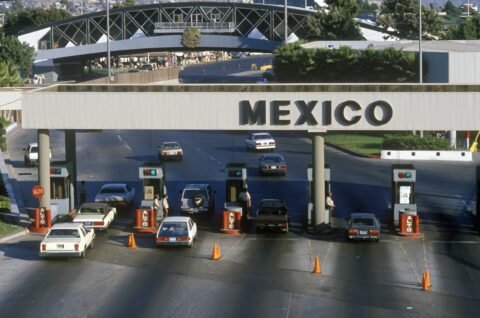Economics

Human Rights Organizations Say Immigrants “Caught in Detention Dragnet”
On any given day, more than 30,000 immigrants are detained in the U.S. More than 300,000 men, women, and children are detained by U.S. immigration authorities each year. ICE reported that the average stay in detention was 37 days; however many immigrants and asylum seekers are detained much longer – months or even years – until they are either deemed eligible to remain in the U.S. or are deported. International human rights organizations have turned their attention toward the detention and deportation of immigrants in the U.S. Yesterday, Human Rights Watch released a new report, “Forced Apart (By the Numbers): Non-Citizens Deported Mostly for Nonviolent Offenses,” which found that three quarters of non-citizens deported from the United States over the last decade after serving criminal sentences were convicted of nonviolent offenses, such as minor drug possession and traffic offenses. Furthermore, one in five of those deported had been in the country legally, sometimes for decades. Read More

Data Supports Benefits of Immigration Reform in a Bear Market Economy
Last week, the White House reaffirmed President Obama's commitment to working on immigration reform during his first year as president. While Obama has made clear that fixing the economy is his number one priority, a summary of recent research released by the Immigration Policy Center (IPC) shows that fixing the broken immigration system could bring us one step closer to economic recovery. As right-wing pundits falsely claim that immigration reform would cost the American public ""billions," available research suggests that -- had the Comprehensive Immigration Reform Act of 2006 passed -- it would have generated a much needed $66 billion in new revenue during 2007-2016 from income and payroll taxes, as well as various administrative fees. Workers with legal status earn and spend more, as evidenced by the effects of the 1986 Immigration Reform and Control Act (IRCA). According to Raúl Hinojosa-Ojeda, Director of the UCLA North American Integration and Development Center, IRCA: Read More

Pay Attention to that Man behind the Curtain
As right-wing political pundits questioned the Obama administrations’ renewed commitment to comprehensive immigration reform yesterday, the Wall Street Journal pulled back the curtain to reveal White House Chief of Staff, Rahm Emanuel, as a new committed ally in the fight for immigration reform. Billed as a brilliant political strategist by Janet Murguia of the National Council of La Raza (NCLR), Rahm Emanuel has taken a new direction in setting the political stage for comprehensive immigration reform to pass. Most recently, Emanuel had a heavy hand in ushering the State Children's Health Insurance Program (SCHIP) bill through Congress. SCHIP is a program which extends health care benefits to legal immigrant children and pregnant women. Read More

“Progressive” Peddlers of Fear 2.0
This just in: “Immigrants are breathing all our American air,” or so the new anti-immigrant front group, Progressives for Immigration Reform (PFIR), would have you believe. Sounds ridiculous, doesn’t it? Unfortunately, it’s not too far off from the laundry list of anti-immigrant topics posing as economic, environmental and social justice issues on PFIR’s website. In a recent post on Imagine2050, Center for New Community’s National Field Director Eric Ward lambastes PFIR for being yet “another addition to a growing list of anti-immigrant groups being set up under the Tanton Network to give the illusion that the anti-immigrant movement is broader than it really is.” Read More

Mexicans Choosing to Weather Economic Storm in Home Country
Department of Homeland Security Secretary Janet Napolitano has ordered reviews of many operational aspects of the immigration and border security system and has even delayed a series of proposed immigration raids and other enforcement actions at U.S. workplaces. Yet while many of the Bush administration's "attrition through enforcement" tactics are being re-evaluated and scaled-back, potential migrants in Mexico and elsewhere are expressing less interest in coming to the U.S. This past weekend, a Houston Chronicle article pointed out that as "jobs in the U.S. dry up" many Mexicans "reverse course for survival" and may "never leave Mexico at all." The article echoes research showing that undocumented immigration is driven by economics and that the tens of billions of taxpayer dollars spent on immigration enforcement over the past two decades have done virtually nothing to dissuade undocumented immigrants from coming here when there are jobs to fill. Read More

Immigration Reform Makes Sense for U.S. Economy
This week the President sent a clear signal that immigration reform is still in the queue for his first year in office. Meeting with the Congressional Hispanic Caucus, he did not waver in his commitment to fixing our broken immigration system. In the context of a weakened economy, immigration reform would actually have a positive impact in contrast to the costly enforcement-only policies of the last administration. This week, the Immigration Policy Center released a synthesis of economic data showing the economic benefits of immigration reform. Some of the data is produced by our government's own Congressional Budget Office, which has declared the benefits of putting workers on a path to legalization. Read More

New CIS Study: Easy Answers and Half-Baked Solutions
Photo from flickr. BY: AMBER SPARKS, UFCW A new report by the Center for Immigration Studies is a perfect illustration of the misinterpretation and manipulation of data to reach a totally biased and flawed conclusion-and clearly demonstrates a complete lack of understanding about the history of the meatpacking industry. Immigrants worldwide have been essential in strengthening the U.S. meatpacking industry, by organizing around increased wages and improved industry standards. But during the ‘80's, something happened. Consolidation, mergers, and company-induced strikes helped drive down wages for meatpackers. During the strikes, companies aggressively recruited strike breakers-not immigrants but individuals who came from the decimated farm industry-to cross the picket lines. Read More

CIS Inadvertently Makes the Case for Legalizing Undocumented Workers
The Center for Immigration Studies (CIS) today released a report which, quite inadvertently, makes an excellent case for comprehensive immigration reform that legalizes undocumented immigrants already living and working in the United States. The report analyzes the high-profile federal immigration raids that were conducted on December 12, 2006, at six Swift & Co. meatpacking plants in Colorado, Iowa, Minnesota, Nebraska, Texas, and Utah. According to the report, wages and working conditions for Swift & Co. workers improved in the aftermath of the raids as more lawfully present immigrants and U.S. citizens joined the company's labor force. The report rightly concludes from the example of Swift & Co. that wages and working conditions improve "when illegal immigrant labor is removed from the workplace." Read More

Condoleezza Rice Wants Undocumented Immigrants Out of the Shadows
Like many in the Bush administration who recently recognized that comprehensive immigration reform is not a roadblock but a vehicle to America’s economic recovery, former Secretary of State Condoleezza Rice highlighted the need for comprehensive reform last week as an economic and social imperative at the Stanford Institute for Economic Policy Research summit. Now a political science professor at Stanford and senior fellow at the Hoover Institute, Rice put the Bush administration’s failure to achieve real reform of our immigration laws ahead of the Middle East conflict in terms of her “deepest regret” as secretary of state. Read More

Border Patrol Deploying Mexican Folk Music as Enforcement Tactic
While funneling more than $1.4 billion into barricading the U.S.-Mexico border with electric fences, vehicle barriers, and 6,000 National Guard troops under the purview of the Bush administration, the U.S. Border Patrol also began a more artistic approach to intercepting the flow of job-seeking nannies and busboys from Mexico in to the U.S. The agency is now doubling as an international record company, producing corridos [up-tempo Mexican folk songs] about tragic border crossings and distributing them to Mexican radio stations in a weak -- albeit creative -- attempt to dissuade their listeners from crossing the border without documents. Read More
Make a contribution
Make a direct impact on the lives of immigrants.
